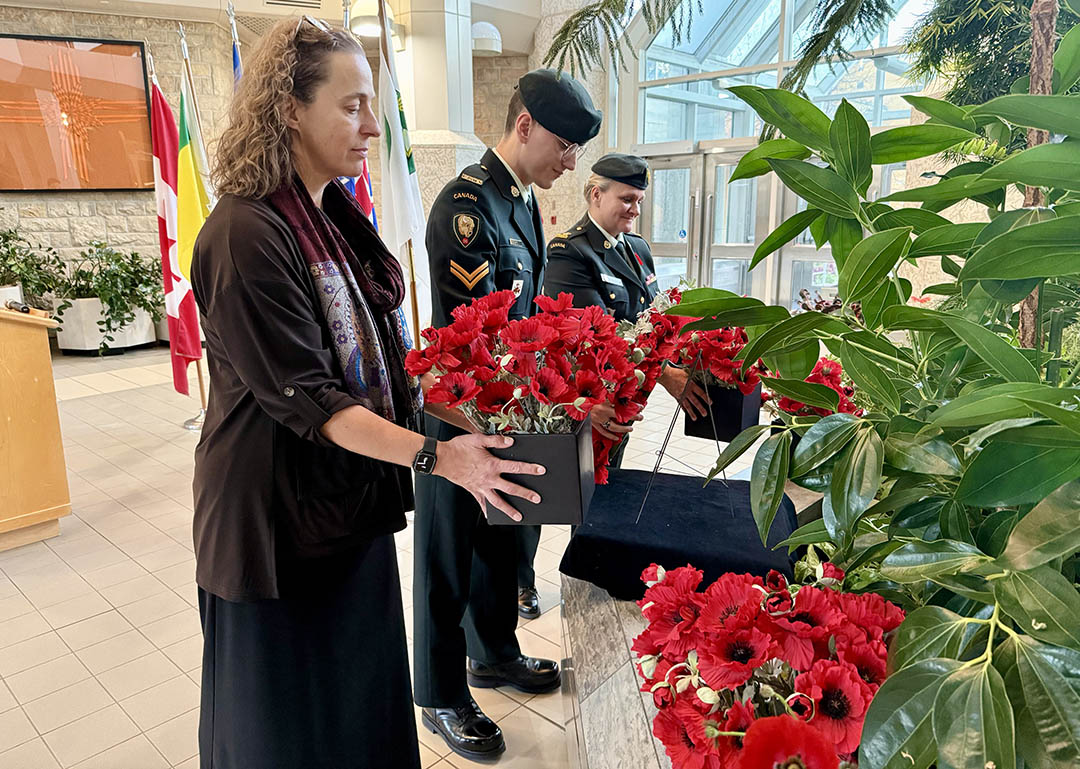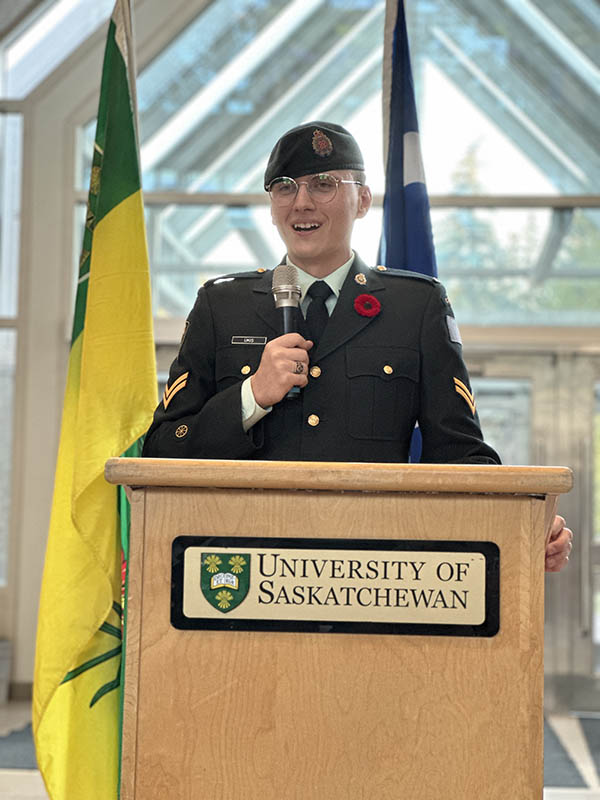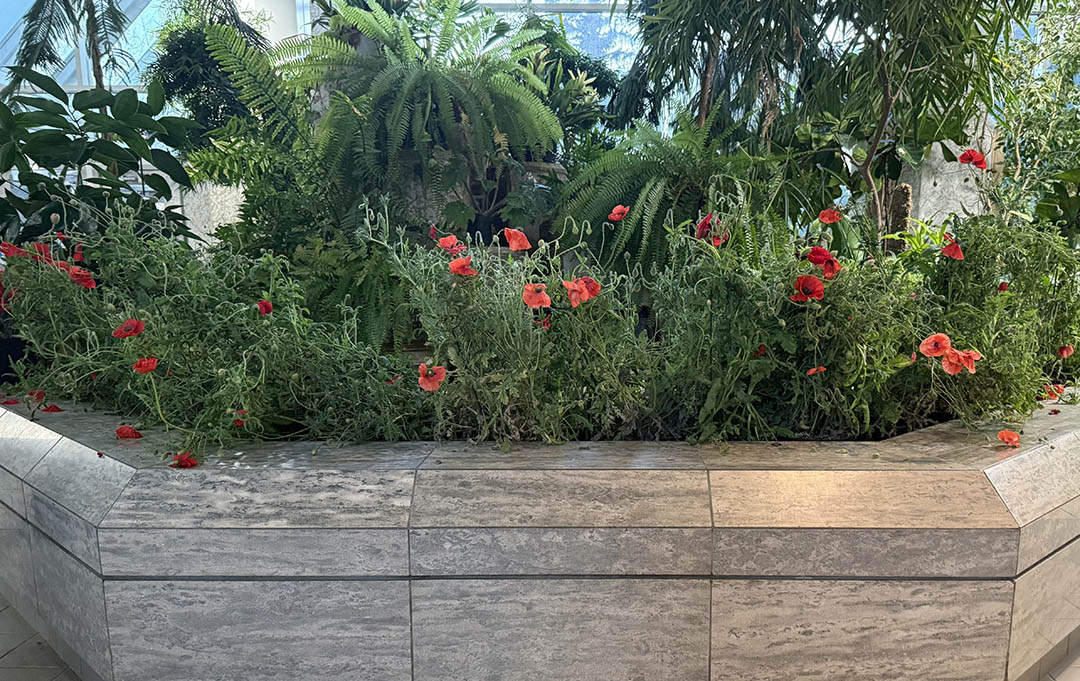
USask horticulture student honours peace by growing poppies
A tribute to peace, in the form of poppies grown from Flanders Fields-sourced seeds, will bloom in the College of Agriculture and Bioresources (AgBio) Atrium for Remembrance Day.
By Joanne PaulsonThe display is a project of the heart for University of Saskatchewan (USask) horticulture student Corporal Fikret Ükis, who has been a member of the Canadian Armed Forces since 2018.
“I thought it would be meaningful to have real poppies growing here on campus. They’re such a powerful symbol; simple, but deeply emotional,” Ükis said.
It has been more than 100 years since the First World War and 80 years since the Second World War, and the world continues to see terrible conflict, he noted.

“People sometimes forget that the freedoms and sovereignty we enjoy today were paid for by the sacrifices of those men and women,” he said. “It’s sad to see how fragile peace can be. The Ukrainians know this better than anyone right now; their sovereignty is currently under threat. Here in Canada, we take peace for granted, and we’ve forgotten how hard people had to fight during the First and Second World Wars, and how hard we still have to fight, to protect it.”
Ükis said the poppy is a delicate flower and needs a lot of care and attention. He started by growing them at home, intending to give them to members of his army unit, but they didn’t fare too well.
So, he asked if he could try the plants in a greenhouse on campus, and was given permission. He did a test trial earlier in the year, and then planted the present crop to bloom in November. He was somewhat shocked to find the Flanders Fields poppy seeds he ordered did not all prove to be the same cultivar.
“There were a few different varieties mixed in with the packet, but they all have that beautiful red colour, each one a poppy in its own way.”
They won’t live all that long, particularly once moved out of the greenhouse, but he hopes they will survive in the atrium until Nov. 11.
“They take about 13 to 14 weeks from seeding to bloom.”
The soldier’s life
Ükis first joined the Canadian Armed Forces as an armoured soldier with the Lord Strathcona’s Horse (Royal Canadians) in Edmonton, where he was trained to operate and maintain Canada’s main battle tanks, the Leopard 2A4.
He never thought he would go to university. Then came COVID-19, and with it “little soldiering time” due to the quarantine. So, in 2020, he started at USask largely online, and decided horticulture would be his future career.
When he returned to the forces post-pandemic, he realized something would have to give now that he was also working toward a degree.
“It was a lot,” he said. “Some of our exercises lasted four months straight.”
After his full-time tank operator contract in Edmonton was up, he moved to a part-time role in the reserves as a Mobile Support Equipment Operator (MSE Ops) with 38 Service Battalion in Saskatoon five years ago.
“It’s not as cool as driving a tank around, but still quite essential to have,” he said with a chuckle.
“MSE Ops are one of the backbones of the CAF, as we move supplies, fuel, and equipment. Without this, the entire operation would come to a standstill.”
Because he did not have his biology and chemistry classes from high school, which are required for horticulture, he technically enrolled in the College of Arts and Science undeclared. But once he had Bio 120 and Chem 112 under his belt, he entered horticulture science in AgBio.
Now going into his fifth year at USask, Ükis is also working on a minor in soil science and a certificate in sustainability, and is considering a master’s degree.
In the greenhouse
His first access to the greenhouse came during a class preparing students to use the facility. Shortly thereafter, disaster struck at home.
“I had a house fire three years ago, and at that point I had over 350 species of plants and it was late November, so I needed to put them somewhere,” he said. “So I reached out and got emergency permission to put the plants there. I was a bit of a special case, in terms of getting access to the greenhouse.”
It wasn’t poppies at first. He has a personal passion for big plants, and has grown a papaya tree, pomegranate, coconut tree, a lemon tree, and more than 350 different species of tropical plants.

Last year, he grew dwarf Cavendish bananas as part of his plant propagation (PLSC 470) class. “Dwarf” turned out to be a bit of a misnomer.
“The class was during the winter term. At the end of the class I kept the four banana plants during the summer. I left it in my parent’s back yard, and they did quite well out there. They grew too big, and I couldn’t put them inside the house, so I asked if I could just leave them temporarily in the greenhouse, just to see them bear fruit.
“I didn’t realize how fast they’d grow in the greenhouse. I’m told it’s the largest banana cluster they’ve seen in the greenhouse.”
Engaged in other research
Since he came to USask, Ükis has also been working on research projects. His first job was at Agriculture and Agri-Food Canada (AAFC) with Dr. Gary Peng (PhD) and Dr. Bruce Gossen (PhD), who are investigating blackleg and clubroot disease on canola.
He then went overseas to do a horticultural International Study Tour (AGRC 311) in Japan, and left AAFC with the thought of returning, “but I had the opportunity to work with Dr. Kate Congreves’ (PhD) (AgBio) lab for a school year, and then got the opportunity to meet the new USask fruit breeder Dr. Anže Švara (PhD) and worked with him in the summer term.”
After those contracts were completed, he returned to working again for the same AAFC lab.
As for the poppies, while he has done most of the heavy lifting, he credits greenhouse and horticulture facility manager Jackie Bantle, greenhouse technicians Eldon Siemens, Katie and Denis, classmate Delton Vandenheuvel, and the soldiers in his unit for their help in maintaining them and setting them out.
He also gives credit to his partner, Mikayla Burghardt, a recent USask graduate with High Honours in Fine Arts. One day, the two hope to work together on a horticulture-and-art project.
As for his current project, Ükis hopes the poppies remind everyone of what truly matters.
“Peace, freedom, and sovereignty are fragile things,” he said softly. “These poppies are a living reminder not to take them for granted.”

